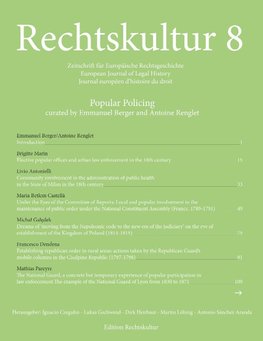
-
 Nemecký jazyk
Nemecký jazyk
Rechtskultur 8
Autor: Emmanuel Berger
Over the past decade, the problem of popular justice has been the subject of a major historiographic renewal. In particular, the conferences at Trento (2012) and Regensburg (2015) advanced on many fronts in our understanding not only of the multiplicity... Viac o knihe
Na objednávku, dodanie 2-4 týždne
44.35 €
bežná cena: 50.40 €
O knihe
Over the past decade, the problem of popular justice has been the subject of a major historiographic renewal. In particular, the conferences at Trento (2012) and Regensburg (2015) advanced on many fronts in our understanding not only of the multiplicity of fields covered by the concept of popular justice but also of the historical processes that conditioned the transformation, the emergence or the extinction of its various forms, from the late 18th century to the present day. With the affirmation of nation-states, this led to the legitimization and institutionalization of the exercise of justice by the ¿people¿under the close control of government. The people's jury is probably the judicial institution most representative of this historical process. However, the establishment of ¿institutional¿ popular justice has had a far from a linear trajectory. On one hand, the legitimacy of the exercise of justice by the people was continually challenged in Europe by conservative governments and by legal professionals alike throughout the 19th and 20th centuries. On the other hand, institutional popular justice does not suddenly erase other types of popular justice. These experience a resurgence, especially during periods of political transition or conflict in the face of the failure or collapse of the State.
From an analysis of both the crisis contexts and the political, economic and social changes in European societies, it is clear that the concept of people's justice needs to be understood beyond the strictly judicial field and be integrated into the broader horizon of the various forms of policing.This process raises numerous questions: how are local citizens involved into the police systems controlled by the State? What forms do these ¿people's police forces¿ take? What relationships do they establish with professional bodies? How do citizens succeed in influencing public order policy? The importance of these questions reflects the need to study the popular components of policing, their evolution over time throughout Europe, and their interaction - or lack thereof - with the bodies of State. By analysing these different dynamics, the contributions this volume will contribute to a reflection that moves beyond the traditionally separate treatment of police force and judiciary. Seen from this perspective, the polysemic nature of popular participation calls for a global and ¿connected¿ reading of the problem of maintaining public order.
- Vydavateľstvo: Förderverein Europäische Rechtskultur e.V.
- Rok vydania: 2019
- Formát: Paperback
- Rozmer: 220 x 170 mm
- Jazyk: Nemecký jazyk
- ISBN: 9783963740398

 Anglický jazyk
Anglický jazyk 









